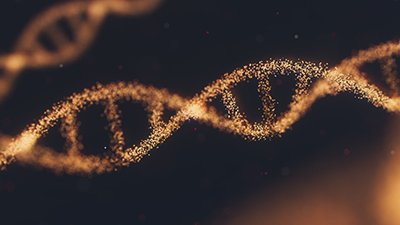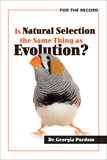
Evolution—The Least Important Topic in Medicine
Could physicians be better doctors if they applied evolution to their practice of medicine?
News Source
- The Boston Globe: “Evolution in medical school: Do we need more of it?”
Despite the wide acceptance of evolutionary beliefs among mainstream scientists, many physicians—whether they accept evolution or not—find evolutionary claims neither relevant nor useful. And the distinction is not due to a deficit of educational attainment: a medical degree is as much a doctoral degree in science as a PhD in the U.S. (and many other countries). Some claim that physicians would be better doctors if they understood evolution better, but many disagree.
Medical educators have a great deal to teach to budding physicians in a short time. The least important topic is evolution.
Evolution is not emphasized in most medical schools. Medical educators have a great deal to teach to budding physicians in a short time. The least important topic is evolution. As the Dean of Yale Medical School, Robert Alpern, explains, “I think evolutionary biology could be taught to a much greater extent, but as a dean who has many passions about education, there are many competing priorities for the time in the curriculum.” Asked whether additional training in evolution would improve the way doctors treat patients or conduct research, Alpern says, “I don’t think they’d change a lot.” Others disagree. Psychiatrist Randolph Nesse, who teaches evolutionary biology at the University of Michigan, has been crusading for decades to get medical schools to give evolution a prominent place. Nesse says, “It’s not too hard to demonstrate that doctors are ignorant about real fundamentals of evolution,” says Randolph Nesse. But Nesse believes “A doctor who has a deep foundation in evolution will think different about disease. Instead of just seeing disease as some screw-up in the machine, they will ask of every disease, why didn’t natural selection make the body more resistant to this particular problem?”
Nesse, along with Yale evolutionary biologist Stephen Stearns and Dean of Harvard Medical School Jeffrey Flier, co-authored an eight-page essay, “Making evolutionary biology a basic science for medicine,” which was published in the 2009 Proceedings of the National Academy of Sciences. The authors believe evolutionary biology “is an essential foundation for a biological understanding of health and disease.” They write that evolutionary methodology is needed to understand population genomics, pathogen evolution, and “why natural selection leaves bodies vulnerable to disease.” The essay notes that the study of DNA has progressed a great deal in recent years and can be used to track the prevalence of observable inheritable traits in populations. The remainder of the essay is largely a summary of Nesse’s 1994 book, Why We Get Sick: The New Science of Darwinian Medicine.
In asserting the need to be taught evolution to understand population genomics, Nesse and his coauthors list the various genetic mechanisms that can affect the fitness and overall makeup of population. They note that those most able to survive and reproduce are those most likely to produce the populations of tomorrow. They therefore conclude, “Natural selection and these other evolutionary mechanisms change species, and, equally important, keep them the same via stabilizing selection that disfavors individuals with extreme traits.”
Doctors do not need an evolutionary look at an untestable past to interpret the epidemiologic and genomic data before their eyes.
Natural selection within the human species has nothing, however, to do with evolution of complexity. In fact, biblical creationists commonly cite the same genetic factors when explaining how various people groups developed after the global Flood and the subsequent dispersion from the Tower of Babel. The genetic tools Nesse believes depend on evolutionary thinking have nothing to do with evolution of complexity. Doctors do not need an evolutionary look at an untestable past to interpret the epidemiologic and genomic data before their eyes.
Evolutionist Richard Dawkins has suggested Nesse’s 1994 book Why We Get Sick? could help get all physicians to become Darwinists. Dawkins said, “If doctors had been wise to natural selection we wouldn't have the problem we now have with antibiotic resistance evolving by natural selection by bacteria.”1 Yet antibiotic resistance has nothing to do with evolution of new genetic information. Antibiotic resistance, as we discussed yet again recently involves natural selection and the genetic shuffling of genes that bacteria already possess. Doctors don’t need to believe in evolution to understand the interaction of natural selection with the rapid shuffling of genetic material in microbes to understand antibiotic resistance.
The essay’s authors cite the importance of understanding and the development of pathogenicity. But as many articles on this website (listed below) have discussed, microbial pathogens can be best understood by realizing the beneficial roles of microbes in the original good, disease-free creation and then examining the changes brought about since sin and death entered the world.
Historically, evolutionary thinking has even caused physicians to make poor medical decisions.
Historically, evolutionary thinking has even caused physicians to make poor medical decisions. Erroneous beliefs that “vestigial organs” were useless evolutionary leftovers led many physicians to destroy them needlessly. For instance, many unnecessary appendectomies were done on the grounds of Darwin’s evolutionary explanations of the differences between human and ape digestive systems.
While premedical students will have to be familiar with evolutionary claims in order to do well on the 2015 version of the Medical College Admissions Test (MCAT), which is being revised to include more questions about evolution, there is no necessity that they actually believe them. In fact, discerning students need instead to understand the difference between evolutionary conjecture and experimental, testable, clinical science (including natural selection) on which they should base their future medical decisions.
Further Reading
- An Evaluation of the Myth That “Nothing in Biology Makes Sense Except in the Light of Evolution”
- Editorial Exhorts Veterinarians and Physicians to Embrace Evolution
- Evolution and Medicine
- Creationist Doctor Questioned
- Why Would an Evolutionist Become a Doctor?
- Modern Medicine and Ancient Authority
- Is Natural Selection the Same Thing as Evolution?
- Why Does God’s Creation Include Death and Suffering?
- Organ Recital: A Parade of Presumed Design Flaws Devoid of Truth
- Scars of Evolution or of a Sin-Cursed World?
- Traditional Treatments for Infections May Strengthen Antibotic Resistance
- Antibiotic Resistance of Bacteria: An Example of Evolution in Action?
- Microbes and the Days of Creation
- The Role of Genomic Islands, Mutation, and Displacement in the Origin of Bacterial Pathogenicity
- The Genesis of Pathogenic E. coli
- Evolving E.coli
For More Information: Get Answers
Remember, if you see a news story that might merit some attention, let us know about it! (Note: if the story originates from the Associated Press, FOX News, MSNBC, the New York Times, or another major national media outlet, we will most likely have already heard about it.) And thanks to all of our readers who have submitted great news tips to us. If you didn’t catch all the latest News to Know, why not take a look to see what you’ve missed?
(Please note that links will take you directly to the source. Answers in Genesis is not responsible for content on the websites to which we refer. For more information, please see our Privacy Policy.)
Footnotes
- C. Jahme, “Richard Dawkins Wants Evolutionary Science To Be ‘the New Classics’,” Guardian, June 12, 2012, http://www.guardian.co.uk/science/blog/2012/jun/12/richard-dawkins-evolution-new-classics.
Recommended Resources

Answers in Genesis is an apologetics ministry, dedicated to helping Christians defend their faith and proclaim the good news of Jesus Christ.
- Customer Service 800.778.3390
- Available Monday–Friday | 9 AM–5 PM ET
- © 2026 Answers in Genesis




